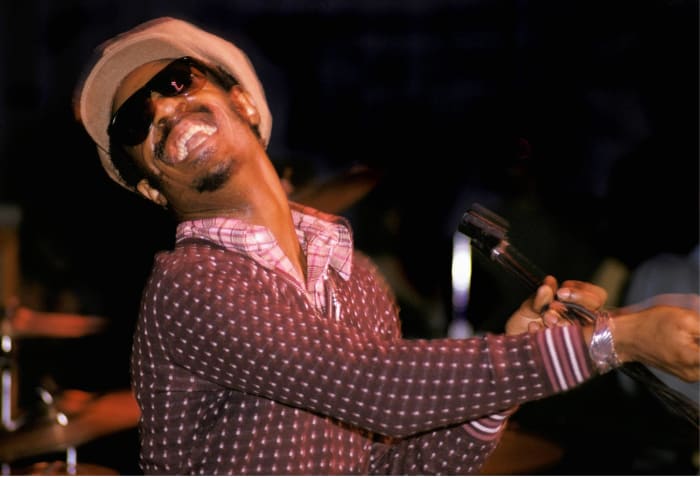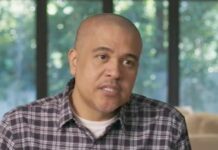
In honor of Stevie Wonder turning the big 7-0 today, we’re celebrating with an “EUR Video Throwback” of the maestro’s tracks that have interesting or peculiar backstories, courtesy of Wikipedia and RollingStone.com.
Fingertips, Pt. 2 (May 21, 1963)
We must start where Little Stevie started, in this month exactly 57 years ago. The live version of this single was recorded during a “Motortown Revue” performance at the Regal Theater in Chicago. “Part 2” picks up when Wonder shouts “Everybody say ‘yeah!'” After a call and response with the audience, a couple of sung verses and Wonder’s crowd-rousing harmonica breaks, Wonder appears to close the song out. Emcee Winehead Willie told the crowd to “give him a hand,” but at the last minute, Stevie changed his mind and returned to sing the “goodbye” encore. The other musicians for the next act – either The Marvelettes or Mary Wells, depending on who’s telling the story – had already taken the stage. As the 12-year-old moves into his impromptu encore, the new bass player, Joe Swift, having replaced Larry Moses, can be heard on the recording, yelling out: “What key? What key?”
Watch below:
Superstition ( October 24, 1972 )
Famed rock guitarist Jeff Beck was a Stevie “stan” and Wonder knew it. Before the recording sessions for “Talking Book,” Wonder thought about collaborating with Beck on the album in exchange for Stevie writing him a song. Between the album sessions, Beck came up with the opening drum beat of “Superstition.” Wonder told him to keep playing while he improvised on top of it. He went on to improvise most of the song on the spot, including the riff. Beck and Wonder created a rough demo for the song that day, and Wonder decided that he would give “Superstition” to Beck as part of their agreement. The original plan was for Beck to release his version of the song first, with his newly formed power trio Beck, Bogert & Appice. But the group’s album was delayed, and Motown CEO Berry Gordy had a feeling that “Superstition” would be a huge hit and boost the sales of “Talking Book.” So not only did Wonder end up with the song, but it was also “Talking Book’s” lead single – released months ahead of Beck’s version, which was eventually issued in March 1973 on the Beck, Bogert & Appice album. Listen to both versions below, followed by both playing a version together in 2009:
Stevie Wonder – “Superstition” Soul Train
Beck Bogert & Appice – Superstition – 1973
Stevie Wonder & Jeff Beck – Superstition 2009
Higher Ground (July, 1973)
Wonder reportedly recorded this single in a burst of creativity. He said, “I wrote it on May 11th. I remember the date. I did the whole thing – the words, the music and recorded the track – in three hours. That’s the first time I ever finished a song so fast. It was almost as if I had to get it done. I felt something was going to happen. I don’t know what or when, but I felt something.” Soon after Motown released the single, a near-fatal car accident in August 1973, in North Carolina, took him to a spiritual higher ground of his own. The crash left him in a coma for four days. he told Q magazine of the recording session, “It was almost as if I had to get it done. I felt something was going to happen. I didn’t know what or when, but I felt something.”
Living for the City (Nov. 1973)
Wonder played all the instruments and was assisted by Malcolm Cecil and Robert Margouleff only for recording engineering and synthesizer programming. It was one of the first R&B songs to deal explicitly with systemic racism and to use everyday sounds of the street like traffic, voices and sirens.
Below, producer Malcolm Cecil recounts how the song was recorded.
Stevie Wonder – Living For The City (live 1974)
You Haven’t Done Nothing (Aug. 7, 1974)
This song was a political statement aimed directly and explicitly at President Richard Nixon. Two days after the song’s release, Nixon resigned in disgrace. The Jackson Five sing the words “Doo da wop!” in the chorus, after Wonder calls on them by name in the song, saying, “Jackson 5, join along with me, say.” The B-side “Big Brother” was also a political statement and taken from Wonder’s 1972 album “Talking Book.” Listen to sides A and B below:
You Haven’t Done Nothin’ – Stevie Wonder
Stevie Wonder – Big Brother (Natural Wonder)
I Wish (Nov. 1976)
For the television series “Classic Albums,” Wonder recreated a small section from the song to demonstrate how he composed and arranged it. He played the keyboards and drums himself, and used most of the musicians that recorded the original. Watch the making of the song in the two videos below, followed by a live performance.
Sir Duke (Mar. 22-1977)
From his 1976 album “Songs in the Key of Life,” this track was written in tribute to jazz legend Duke Ellington, who had died in 1974. The lyrics also refer to Count Basie, Glenn Miller, Louis Armstrong and Ella Fitzgerald.
Do I Do (Feb. 19, 1982)
The album version of the song is ten and a half minutes long and features Stevie spittin’ bars near the end. Jazz icon Dizzy Gillespie contributes a trumpet solo, and bassist Nathan Watts delivers a bass line that was noted among fellow musicians at the time for its intricacy.
As (October 1977)
Herbie Hancock contributed Fender Rhodes piano on this seven-minute track and it’s now seen as one of Wonder’s finest love songs. It took a while for the song to be appreciated. At the time, it peaked at only No. 36 on the Hot 100.
We Publish News 24/7. Don’t Miss A Story. Click HERE to SUBSCRIBE to Our Newsletter Now!





